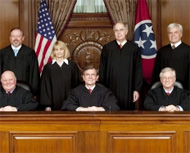10/15/2014
Tennessee Courts Crack Down On Cops Taking Blood From DriversTennessee Court of Criminal Appeals twice strikes down warrantless, forced blood draws in suspected drunk driving cases.

The US Supreme Court's McNeely decision (view case) has made it much more difficult for police officers to forcibly draw blood from motorists without a warrant. Last week, the Tennessee Court of Criminal Appeals became the latest to apply the precedent to discourage the practice statewide.
Defendants in these driving under the influence of alcohol (DUI) cases are rarely sympathetic figures. Cases that reach the appellate level usually have prior convictions and were visibly intoxicated at the time of arrest, but the principles that allow officers to forcibly draw blood from repeat offenders also allows them to draw blood from innocent motorists.
In the case of James Dean Wells, he was a second offender who smashed his truck into a pole and then into the side of a building in Williamson County in the early hours of May 12, 2012. Wells left the scene of the accident, but Officer Cory Krueger tracked him down twenty minutes later. Wells refused to have his blood drawn, so it was taken by force at a nearby hospital.
The county has a magistrate on standby to prepare warrants 24 hours a day, but Officer Krueger made no attempt to obtain one. Prosecutors argued that no warrant was needed because there were "exigent circumstances" and the implied consent doctrine allowed it. The appellate judges rejected this reasoning.
"While the state may attempt to persuade the accused to submit to a search by providing consequences for a failure to submit to a test ordered upon probable cause, we hold that the privilege of driving does not alone create consent for a forcible blood draw," Judge John Everett Williams wrote for the three-judge panel (view full opinion, 200k PDF). "Given the gravity of the intrusion into privacy inherent in a forcible blood draw, we conclude that such a search is not reasonable unless performed pursuant to a warrant or to an exception to the warrant requirement. The implied consent law does not, in itself, create such an exception."
Just three days earlier, the Court of Criminal Appeals had handed down a similar ruling in the case of Charles A. Kennedy who also had his blood drawn by force in Williamson County. Fairview City Police Officer Shawn Malhoit stopped Kennedy's red pickup truck on May 8, 2012. It was his third DUI arrest. Kennedy refused a blood test and a phlebotomist took it by force at the hospital after a thirty minute wait. No warrant was obtained.
"We recognize that, in this case as in McNeely, the state bore a particularly difficult burden in trying to establish the existence of exigent circumstances when the exigent circumstances exception was not the original justification for the warrantless blood draw," Judge James Curwood Witt Jr wrote for the three-judge panel (view full opinion, 150k PDF). "That said, the record simply does not show any exigency sufficient to justify Officer Malhoit's failure to obtain a warrant before causing the defendant's blood to be drawn in this case."
No fewer than three officers were involved in Kennedy's arrest, so the court found it unlikely that at least one of them was unable to contact the on-duty magistrate for a proper warrant. More than an hour passed between Kennedy's initial refusal and the time his blood was drawn.
"The state fails to explain why it would have been impossible for Officer Burgess to transport the defendant to the hospital while Sergeant Stockdale transported Officer Malhoit to the jail to obtain a search warrant, leaving Officer Jarosz on patrol," Judge Witt wrote. "The only statement offered on this point was that the streets of Fairview would be 'less safe.' Such an arrangement, however, would not have left the streets of Fairview any less safe than they were during the defendant's refusal to perform field sobriety tests."
The court refused to strike down a Tennessee law suggesting the possibility of forced blood draws, pointing out that it is constitutional as long as warrants are used.


